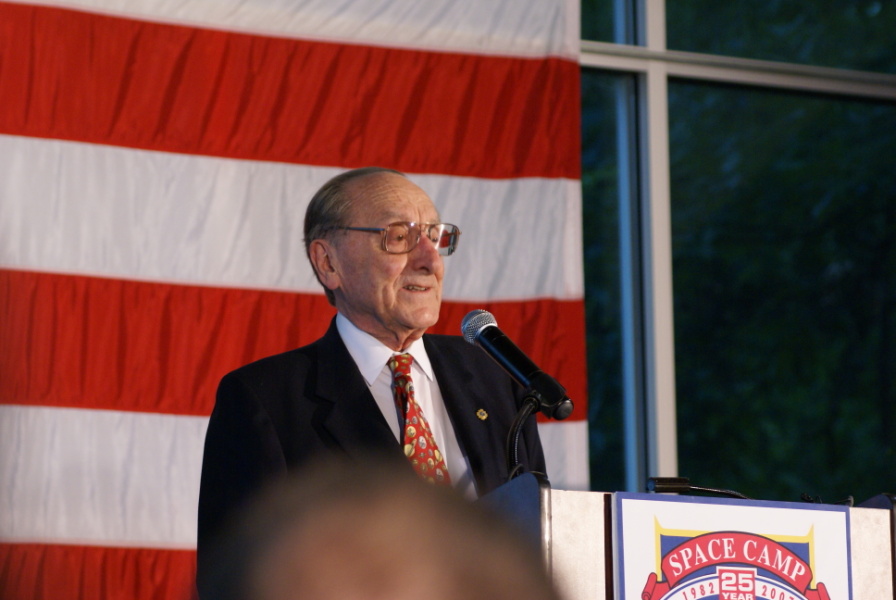| Prev |
heroicrelics.org USSRC Saturn/Apollo Reunions Site Index Fourth Annual Saturn/Apollo Reunion (2007) Gallery |
Next |
George Mueller
Here are George Mueller's remarks:
Walt is one of those guys that you really hate to come after. [laughter]
You know, in the beginning there was Sputnik. That was 50 years ago. It was in 1957 that mankind's first spacecraft was placed in orbit by the Soviet Union. In 1958 the United States orbited its first spacecraft on the Jupiter-C, a vehicle built right here in Huntsville.
It was thus that the human race began its race to conquer space. Unfortunately, space became a de facto servant in a contest to dominate the earth between two ideologies and that competition led to the steady increase in [unintelligible] and complexity of space deeds. For example, in 1958 the United States had three circumlunar flights to the moon. The characteristic of these early flights all failed to reach their objectives.
In the first 12 years of spaceflight, the USSR launched 32 spaceflights, while the USA launched 34 satellites and 20 manned flights, three of which went to the moon. That's in the first 12 years of spaceflight. Thus the age of space flight began.
Fortunately for the world, the surge in competition for leadership in space substituted for a more direct conflict, and today we are living and working with what remains of the USSR.
But we must not lose sight of the humans that made this possible. First, there were Presidents Eisenhower and Kennedy: Eisenhower, for establishing NASA, and President Kennedy for setting the challenge of the moon landing in the decade of his administration. Followed by President Johnson who supported its creation and in such support [unintelligible] and of both parties. In the House there was "Tiger" Teague and in the Senate there were Clinton Anderson and Margaret Chase Smith. Without their support, the quintet of Sam Phillips, Wernher von Braun, Bob Gilruth, Kurt Debus, and I could not have been successful in carrying out the lunar landings in the decade.
Without these five leaders, perhaps the most effective team of engineering managers in our country's history, we would not have been on the moon at all. Again, these were just the tip of the iceberg, the iceberg of some 250,000 very talented people. There's never enough time or words to properly recognize the essential contributions each one made to the success of the Apollo program.
For instance, here at Huntsville, Eberhard Rees and Arthur Rudolph and Ernst Stuhlinger and on and on and on. And at other centers, such as Joe Shea and George Low and Max Faget and Rocco Petrone and Bill Schneider and John Disher -- I could go on all evening and never name them all. With all of them in the iceberg, perhaps one of the greatest achievements in the program, achieved by Wernher von Braun and his team at Huntsville was the creation of the Saturn V. With them was made possible our landing on the moon in 1969.
And now, 38 years later, and one reason for our gathering here this evening, is the move of one of the last of these tremendous vehicles, the largest ever built, into its new, permanent home here at Marshall Space Flight Center.
So let me end by telling you what a pleasure it is to be here, celebrating the 50th anniversary of spaceflight and the 40-year anniversary of the Saturn vehicle which got us to the moon on time.
I'd like to thank you, and here's Owen Garriott.

| Time picture taken | Fri Jul 13 19:22:08 2007 |
| File name | dsc39614.jpg |
| Location picture taken |
Space Camp Cafeteria US Space & Rocket Center Huntsville, AL |
| Prev |
heroicrelics.org USSRC Saturn/Apollo Reunions Site Index Fourth Annual Saturn/Apollo Reunion (2007) Gallery |
Next |